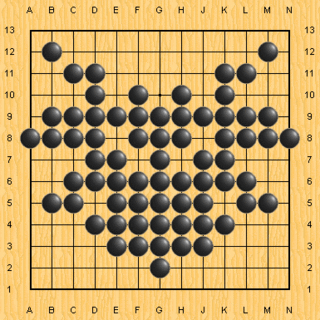The kifu as a Rorschach test
I must have played at least six 13x13 games at various times on IGS, DashBaduk and KGS today. Maybe eight. I'm sure that I lost half of them for failure to make living groups. This is an area I'll need to read-up on.
Chatted with DrPep (22k?) this evening but we wound-up playing other opponents rather than each other. We chatted about his upcoming vacation (particularly the demanding preparations) and briefly touched on how one's state of mind affects one's game. I joked that we were evenly match against each other this evening because we were both mentally frazzled.
One of the anonymous quotes found in Sensei's Library goes:
The board is a mirror of the mind of the players as the moments pass. When a master studies the record of a game he can tell at what point greed overtook the pupil, when he became tired, when he fell into stupidity, and when the maid came by with tea.Truly, the game reflects the state of one's mind and you could also use the kifu (game record) as something like a Rorschach test.
It was the same in kendo and in fencing. In both the dojo and the salle, a clear mind yielded excellent play. A clouded mind - one bothered by upcoming midterms, anger, or a recent tiff with a significant other - yielded substandard play. I heard that pros learn to develop a mental toughness which differentiates them from talented amateurs.
I believe it was Paul Brunton who wrote:
No victory can ever be won when it is already lost in the mind.






2 Comments:
Great post, Chiyodad.
I always found that I fenced my best when I forgot myself entirely. I would get a touch and then realize I didn't really have any idea what I'd just done, as if I had been in a kind of trance. Which is funny, considering what a tactical game it is.
Hello again Alan,
Yes. Ability increases when the conscious action becomes sub-conscious. Tactical play in sports, and perhaps in Go, should eventually become as natural as eating or breathing. That is why repetitive drills are needed; to condition both the mind and body to naturally react to a situation without conscious thought. This understanding seems to be universal.
If I recall correctly, Musashi Miyamoto referred to it as the state of no-mind. Modern athletes refer to it as The Zone. It's akin to a state of flow that does not require conscious thought.
I tried to experiment with flow by playing Speed Go. My conclusion? I need more drills.
Post a Comment
<< Home